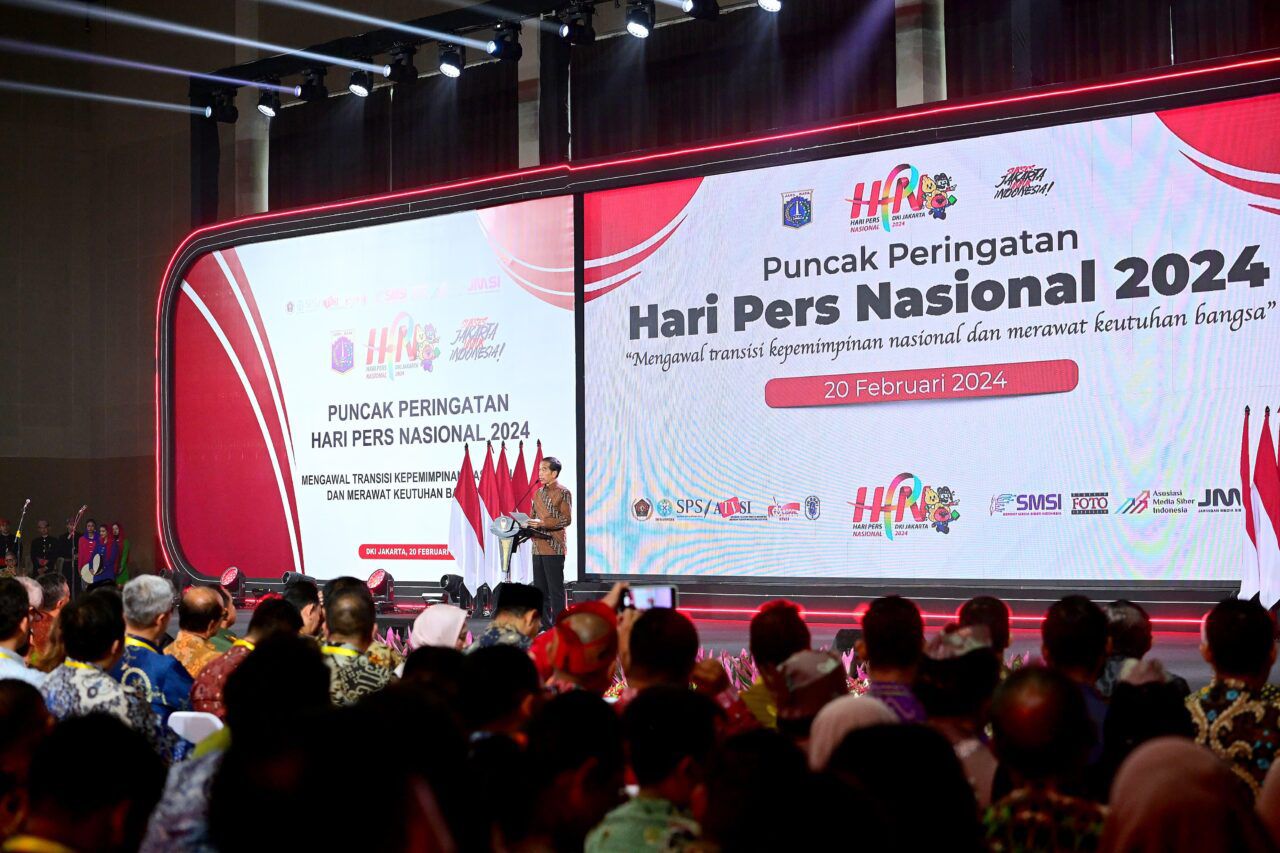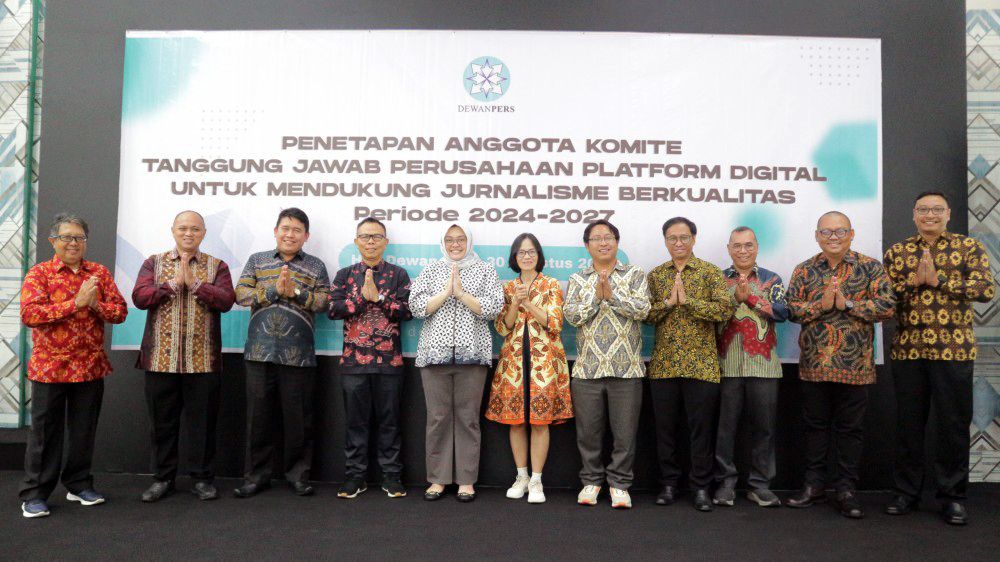How Big Tech Lobbying Changed Indonesia’s Tech Regulations
Krisna Adhi Pradipta, Raymundus Rikang / Sep 16, 2025This article is part of the project "The Invisible Hand of Big Tech," led by Agência Pública and El Centro Latinoamericano de Investigación Periodística (CLIP), with the participation of 15 other organizations — including Tech Policy Press — from 13 countries. Read more about the project and find other articles in the series here.

lIlustration by Tempo/Djunaedi
Held at the Ministry of Communication and Digital, Central Jakarta, Google launched a new feature titled “Berita Pilihan” on Wednesday, May 28, 2025. This additional feature, popularly known as Google News Showcase, displays curated news on Google’s website.
Google partnered with 34 media companies as collaborators to provide content for the “Berita Pilihan” feature. Tempo is one of them. The American technology company will provide compensation to media outlets whose content appears in the “Berita Pilihan” platform.
The Chair of the Committee on Platform Companies’ Responsibility to Support Quality Journalism, Suprapto Sastro Atmojo, who attended the ceremony at the Ministry of Communication, welcomed Google’s initiative to support quality content. “However, there are still other responsibilities of digital platforms, such as holding training sessions,” said Suprapto when contacted on Thursday, July 31, 2025.
The Committee on Platform Companies’ Responsibility to Support Quality Journalism is also known as the Publisher Rights Committee. This organization was formed after Joko Widodo issued Presidential Regulation No. 32 of 2024 on Publisher Rights.
The task of the Publisher Rights Committee is to ensure digital companies fulfill their obligations to support quality journalism. The launch of Google News Showcase is one form of implementing the presidential regulation on publisher rights.
Like Suprapto, Deputy Minister of Communication and Digital Nezar Patria appreciated the commitment of digital companies to support the media ecosystem in Indonesia. “That is in line with the presidential regulation on publisher rights, which aims to strengthen the press,” said Nezar.
The presidential regulation on publisher rights had actually been proposed since 2020, or four years before Jokowi signed it. The idea for the regulation arose after editors-in-chief of various media in Indonesia complained to Jokowi about the disparity between press companies and digital platforms.
They referred to Australia’s experience in creating the News Media Bargaining Code (NMBC). In that country, the regulation on publishers’ rights was made after the Australian Competition and Consumer Commission (ACCC) found an imbalance in revenue between media companies and technology platforms.
The initiative was well received. Jokowi supported the media executives’ proposal to create regulations governing the relationship between technology companies and media. “Don’t let everything be taken by digital platforms, with no taxes paid, and no rules in place,” said Jokowi during a speech commemorating National Press Day 2020 in South Kalimantan.

President Joko Widodo inaugurated the presidential regulation on publisher rights during National Press Day 2024 on February 20, 2024. Press, Media, and Information Bureau of the Presidential Secretariat/Muchlis Jr
The tug-of-war that happened during drafting the regulation on publisher rights was shadowed by lobbying from technology companies. Lobbying strategies are often used by technology companies to intervene in policymaking and regulation in various countries.
A global collaboration led by Brazil’s Agência Pública and Centro Latinomamericano de Investigación Periodística (CLIP) sought to investigate the lobbying tactics of technology corporations operating in 13 countries by gathering 17 media organizations worldwide. Tempo is the only Indonesian media involved in this global collaborative project.
Three sources involved in drafting the presidential regulation on publisher rights said that technology company officials actively lobbied the drafting team and the government to ease the obligations on tech companies. Two topics that concerned them were the revenue sharing clause and algorithm transparency.
Former Director General of Public Information and Communication at the Ministry of Communication and Informatics, Usman Kansong, said technology companies indeed objected to providing compensation and opening their algorithms to the press. “That already goes into the behind-the-scenes operations of technology companies,” said Usman.
For media companies, search engine algorithms are very important. They determine the distribution of content to audiences and the revenue from digital advertising. The more often content appears in search engines and is read by audiences, the greater the media’s revenue.
The provisions on revenue sharing and algorithms led companies to lobby the Indonesian government directly. Usman said that Google representatives once met him and claimed they were already cooperating with media companies. One example was through fact-checking programs.
The executives asked the government not to issue regulations requiring big tech to share revenue with the media. After all, the big tech firms were already collaborating with Indonesian media even without special regulations.
A source at the Ministry of Communication explained that big tech companies viewed cooperation with media organizations as business-to-business. Therefore, the government did not need to create a special legal umbrella.
The Ministry of Communication disagreed with Google’s proposal. Usman told Google representatives that there was no guarantee technology companies would continue to help the media without regulations on publisher rights. “Assistance from big tech companies was voluntary,” said the former Editor-in-Chief of Media Group.
A member of the Publisher Rights Committee, Damar Juniarto, recounted that technology companies initially objected to articles regulating algorithm transparency, revenue sharing with publishers, and obligations to cooperate with media companies. “Technology companies kept protesting,” he said.

Establishment of the Publisher Rights Committee in Jakarta, August 30, 2024. ANTARA/Fathur Rochman
Objections from several technology companies regarding the publisher rights regulation were evident during meetings organized by the Publisher Rights Committee and the Ministry of Communication. Damar said big tech corporations often ignored invitations to committee meetings. They only agreed to attend when invited by the Ministry of Communication.
In several meetings, representatives of technology giants argued that publisher rights should not apply to certain major technology companies. To avoid obligations to publishers, the tech companies argued that their business scale in Indonesia was very small and that their business focus was on entertainment content rather than news. “This presidential regulation was not taken seriously by them,” said the Director of the Digital Anti-Disinformation Working Group in Indonesia (Kondisi).
Lobbying by technology companies eventually reached the State Palace. Former Director General of Public Information and Communication at the Ministry of Communication and Informatics, Usman Kansong, heard that Google once sent a letter to the State Secretariat to express its stance on the contents of the publisher rights regulation. “But it was still not accommodated,” he said.
It was different with Meta—the parent company of social media platforms Facebook, WhatsApp, and Instagram. According to Usman, Meta’s delegation once met Deputy Minister of Communication Nezar Patria. Meta conveyed its position on the publisher rights regulation. Nezar then reported his meeting with Meta to Usman, who was responsible for drafting the publisher rights regulation.
According to Usman, Meta requested to be excluded as a technology company regulated under the publisher rights regulation. Meta argued that the California-based company was not a content aggregator.
An official at the Ministry of Communication said Meta’s representatives in Indonesia tried to align their stance with the parent company’s policy. According to this source, during the drafting of the presidential regulation on publisher rights, Meta had already removed news content from its database indexing.
Responding to Meta’s aspiration, Nezar’s internal team once drafted a new article to exempt technology companies that did not harvest news on the Internet. Usman rejected the draft. “I dare bet that other technology companies like Google would protest,” said Usman, recounting his explanation to Nezar.
Usman reiterated his objection to Meta’s proposal during a meeting with the company’s representatives. “We uphold the principle of equality before the law,” Usman told Meta officials who came from the United States. “Therefore, I cannot accommodate your proposal.”
Nezar did not respond to the interview request sent to his mobile number until Thursday, September 4, 2025. Meanwhile, a senior executive at Meta responded to Tempo’s request for confirmation but refused to allow their explanation to be quoted in writing.
Even so, a source familiar with the drafting of the publisher rights regulation said that technology companies actively participated in various consultation forums for regulation-making because the decision could affect their business in Indonesia. However, tech companies believed there was a misunderstanding of their business model.
According to the same source, companies were considered to be profiting from news content. In fact, it was publishers who voluntarily shared their news content on platforms developed by technology companies.
Technology companies not only negotiated with the government but also with the online media community. The Chairman of the Indonesian Cyber Media Association, Wahyu Dhyatmika, said that Google once mentioned its ability to carry out deindexing or remove news content from search engines.
According to Wahyu, if a tech giant like Google executed a de-indexing decision, media companies would be directly hit. This is because most media revenue in Indonesia still depends on readership traffic generated by search engines like Google. “With just one click, no users would be able to read news on their platforms,” Wahyu said in Jakarta on Wednesday, July 2, 2025.
The debate over the publisher rights regulation was not only about its content. The parties also debated its legal form—whether it should be a law or a presidential regulation. The Director General of Public Information and Communication from 2021–2024, Usman Kansong, said the drafting team initially wanted to make the regulation at the level of a law. “There was even an academic manuscript prepared,” he said. “We asked Padjadjaran University to draft it.”
According to Usman, former Minister of Communication and Informatics Johnny Gerard Plate had once proposed including provisions on publisher rights and technology companies in the Electronic Information and Transactions Law (ITE Law). Johnny wanted to accelerate the process because the government and the House of Representatives were already discussing revisions to the ITE Law.
The option of combining publisher rights rules with the ITE Law later failed. The drafting team rejected it because they did not want provisions on the press to be included in the ITE Law, which contains vague articles often used to criminalize critical citizens. “That would be dangerous,” said Usman.
The drafting team also considered creating a new law. However, discussions in parliament were estimated to take at least six years. The idea of drafting a government regulation also emerged, but the team struggled to find the right legal basis. “A presidential regulation was considered the most appropriate because it could be enacted quickly and stand on its own,” said Usman.
A Google Indonesia representative said the company had been assisting news publishers in Indonesia to build their businesses. Google had launched several programs, such as the Google News Initiative, which provided support to media organizations to improve journalists’ skills and the quality of their products. “Our partnership supports the improvement of journalism quality and helps publishers build stronger and more sustainable business models,” Google Indonesia said in a written statement to Tempo on Friday, August 29, 2025.
In the end, the government, the drafting team, and the platform companies chose a middle ground. The Chair of the Press Council 2022–2025, Ninik Rahayu, who was involved in the drafting alongside technology companies, said the tech giants firmly refused when asked to guarantee and determine what constituted quality journalism.
According to Ninik, the parties negotiated and eventually agreed to replace the wording on algorithm transparency, which had been contested by technology companies. As a result, technology companies are now only required to make their best efforts in designing algorithms. “The most important thing is designing algorithms to support reporting that reflects diversity and does not cause polarization,” said Ninik.
Close relations between platform companies and the government are often shaped by the career histories of some technology executives. Big tech firms typically have a special division known as the government relations desk or government affairs department.
An official from the government affairs department of a U.S.-based tech company explained that the trend of forming internal teams to foster relations with the government began around 2010. These teams are usually experts who are tasked to handle and prepare studies on regulations in Indonesia.
Another task is to meet senior government officials to ensure that the company’s interests align with state policy. According to the same source, their strategy in approaching the government is to provide training and technical assistance related to information technology.
Tempo traced the backgrounds of several tech executives working in government affairs departments. On LinkedIn job history pages, some of these executives had worked at ministries or state institutions. Others were legal experts or retired officials who understood how regulations are made in Indonesia.
Tech companies also use engagement tactics by supporting government digital programs. Throughout 2025, the Ministry of Communication and Digital partnered with several global tech companies in various strategic programs. One example is the 2025 Digital Talent Scholarship (DTS), which brought in major names such as Microsoft, Cisco, Google, Indosat, Alibaba, and Amazon Web Services (AWS).
Deputy Minister of Communication Angga Raka Prabowo explained that the DTS 2025 program was designed to foster digital skills among Indonesians. The government is targeting 100,000 graduates who will receive training in artificial intelligence, cybersecurity, cloud computing, and programming. “Partnering with central government, local government, and digital technology companies is important,” said the Gerindra Party politician.
Relations between platform companies and government are sometimes bridged through regional business forums. This is unsurprising, given the immense market value of these tech giants. Alphabet, Google’s parent company, is valued at nearly US$3 trillion—or almost Rp 50 quadrillion—according to Companies Market Cap. Meta’s valuation reaches nearly US$2 trillion. With such figures, the business community and the U.S. government—the home country of these tech giants—do not want turbulence in their representative offices abroad.
In 2022, the United States-ASEAN Business Council sent a 20-page letter to the Ministry of Communication, then led by NasDem Party politician Johnny Gerard Plate. Signed by Senior Vice President and Regional Managing Director Michael W. Michalak, the letter challenged various planned content regulations for digital platforms.
The letter from Michalak was a response to the Ministry’s proposal of a draft Government Regulation on Non-Tax State Revenue. At that time, the government sought to fine tech companies if they failed to remove content deemed in violation of the Electronic Information and Transactions Law (ITE Law).
A copy of the letter reviewed by Tempo contained several objections from the US-ASEAN Business Council. One concerned fines determined based on the type of company, number of users, and type of problematic content. The fines would be multiplied if companies were slow to remove such content.
Amid the polemic over fines for social media companies, U.S. Ambassador Sung Y. Kim even met with Minister Johnny. The Indonesian government was reminded not to issue regulations unfriendly to investors.
Johnny later admitted meeting with Ambassador Kim but denied that Indonesia was becoming hostile toward investment from tech companies. “We openly discuss input from digital platform companies,” said Johnny—later sentenced to 15 years in prison in the telecommunications tower corruption case at the Ministry of Communication.
The practice of tech companies lobbying to influence government policy is not unique to Indonesia. Similar lobbying occurs in other countries that have introduced special regulations for digital platforms.
In Australia, Google and Meta employed pressure tactics during the drafting of the News Media Bargaining Code (NMBC). In 2021, Meta blocked all news content on Facebook and Instagram for six days to protest regulations requiring payment of publisher rights. The platforms restored news features only after the government relaxed the rules.
Similar tactics appeared in Canada. In May 2022, a month before the government introduced the Online News Act to parliament, Google hosted an exclusive Newsgeist event in Montreal. The event brought Google executives together with journalists, academics, and media figures in informal discussions. Just days before the event, the only government official present at a discussion at McGill University was pressured by participants who openly criticized the draft bill.
During debates on the Online News Act, Google tested limiting access to news for some users. Meta went further by blocking all news content on Facebook and Instagram for users in Canada. As a result, traffic to local news sites reportedly dropped by as much as 43 percent.
As in Australia and Canada, tech companies also lobbied the Brazilian government during deliberations of the Fake News Bill. The regulation required platform companies to compensate media organizations.
Visits by Google and Meta’s public policy teams to the Brazilian parliament became more frequent between March and June 2023—when the regulation was being debated by legislators —compared to the previous 18 months. Additionally, Google spent over US$420,000 campaigning through ads in print media, radio, billboards, and digital platforms. Debate over Brazil’s publisher rights regulation was eventually postponed.
A Canadian parliamentary study released in November 2024 provided a comprehensive picture of lobbying patterns used by global tech companies. Georg Riekeles, Director at the European Policy Centre, likened big tech’s approach to that of the tobacco industry in influencing policy. “It’s about shaping the narrative,” said Riekeles. “They use political backing, funding, philanthropy strategies, litigation, intimidation, and international pressure.”
In the same report, Erik Peinert of the American Economic Liberties Project stated that platform companies view regulation as a direct threat to their business model. “Their response is hostility,” he emphasized.
Recently, digital platform companies have refined their tactics to weaken publisher rights regulations worldwide. Australia’s NMBC was shaken after Google announced it would withdraw from renegotiating remuneration for the Public Interest Publisher’s Alliance (PIPA).
PIPA is a coalition of 24 independent media outlets that negotiated payment agreements under the NMBC in May 2022. Earlier, Meta had already pulled out of the NMBC deal. Meta’s withdrawal appears to have influenced Google’s stance as well.
Many countries are still struggling to regulate big tech. In Europe, several press publishers criticized Google’s trial removal of press content from its search engine. A joint statement signed in January 2025 by the European Magazine Media Association (EMMA), European Newspaper Publishers’ Association (ENPA), European Federation of Journalists (EFJ), News Media Europe (NME), and Reporters Without Borders (RSF) condemned the test as intimidation.
“Google’s trial makes journalistic content invisible in search engines,” wrote Antoine Bernard, Advocacy and Assistance Director at Reporters Without Borders. “This must be stopped.”
Indonesia’s Publisher Rights Committee faces similar challenges as global media organizations. Committee Chair Suprapto Sastro Atmojo said his institution must also deal with tech companies that seem to drag their feet in fulfilling obligations to media firms. “[The] media have been waiting for commitments from tech companies, even if the value is small,” said Suprapto.
Big Tech's Invisible Hand is a cross-border, collaborative journalistic investigation led by Brazilian news organization Agência Pública and the Centro Latinoamericano de Investigación Periodística (CLIP), together with Crikey (Australia), Cuestión Pública (Colombia), Daily Maverick (South Africa), El Diario AR (Argentina), El Surti (Paraguay), Factum (El Salvador), ICL (Brazil), Investigative Journalism Foundation - IJF (Canada), LaBot (Chile), LightHouse Reports (International), N+Focus (Mexico), Núcleo (Brazil), Primicias (Ecuador), Tech Policy Press (USA), and Tempo (Indonesia). Reporters Without Borders and the legal team El Veinte supported the project, and La Fábrica Memética designed the visual identity.
Authors


